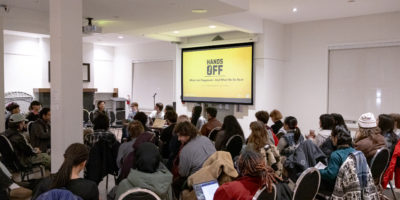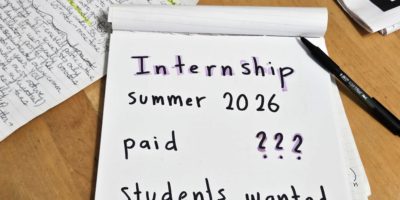By Jeffrey Hawkins
While sitting with the rest of the full house audience at the opening of the play Banana Boys, the author of the book upon which the play is based is casually sitting in the third row.
He isn’t soaking up the ambiance of an opening night crowd, or gushing with the actors behind closed curtains. Instead, he sits patiently with the audience, parents at his side and waits for the show to begin.
The play is all about him, or at least the many sides of him. Banana Boys is an adaptation from the original novel by Ryerson Graduate Journalism student Terry Woo, which opened last weekend at the Factory Studio Theater (125 Bathurst St.) and runs until Oct. 3.
The hilariously smart stage adaptation is based around the experiences of five Chinese-born Canadians (A.K.A. banana boys: yellow or Asian on the outside, white on the inside) growing up in Ontario.
The play depicts the evolving friendship between Luke, Michael, Rick, Dave and Sheldon from the time they meet at the University of Waterloo up to the point where the characters realize the true meaning of friendship.
The challenges faced by each character are central to describing all the facets of what it means to be a banana boy and how this affects their personal identities. During one of the more prominent scenes in the first act, Michael-the character most identifiable as Woo himself-is wracked by insecurity and indecisiveness and confronted by the ghost of his dead friend who is challenging him to finish writing his book.
This scene recurs throughout the play and has a haunting resonance of the inner battle Woo endured while going through the early stages of writing his own book throughout his university years.
Growing up in Sarnia, Ont., Woo had to cope with schoolyard bullies who routinely attacked him for being Asian, which left deep emotional scars. Having been alienated by Asians for not being “Asian” enough and being shunned by whites because he wasn’t “white” enough left him in a state of cultural dislocation from which he did not recover for years.
Although Woo has vowed never again to step foot in Sarnia, he admitted that the book “would not have been written without going through that time of my life.” The shame and ridicule of his past still haunts him.
Even to this day, as he sits in Second Cup sipping coffee, his hands clench the cup when he describes how it felt to be bullied by the other children. “You know what they’re like,” he says. “They pick on the kid with braces or the fat kid; with me they used racial comments.”
He learned through this experience that the term banana boy can be negative and positive.
Woo has adopted it as his own and he now uses it to reflect uniqueness. He began working on the first draft of what was more like a journal rather than a critically acclaimed novel during these formative years of university life. “I just knew that something was happening and I needed to get it down on paper, so I started writing everything out.”
After several years of trying to find a publisher, Woo was able to capture the attention of the Riverbank Press, who agreed to publish the book. After four years on the shelves, the book received immensely positive feedback from media and fans and attracted the attention of Leon Aureus, a founding member of the Fu-GEN Asian Canadian Theater Company.
Fu-GEN, which stands for Future Generation, is a Toronto-based, non-profit theatre company that showcases Asian-Canadian voices. Aureus approached Woo about writing a stage production, and over the course of beer and wings an agreement was reached.
For the price of one dollar, Aureus was given the screen rights-oddly enough Woo admits that he still hasn’t seen this dollar. When asked whether he was worried if Fu-GEN would reinterpret the story into something that it’s not, Woo says, “not at all! I have all the confidence in the world that this play is going to kick ass! And after all, at the end of the day I still have my book.”
To Woo, the production could not have come at a better time. His father is an engineer and the only English he knows comes from the engineering textbooks he uses for work, which rendered English novels unnecessary.
His mother simply did not see the need to learn how to read the English language when she first arrived in Canada. This suited the Woo family fine until their son declared that he was tired of engineering and wanted to become a writer, and that he was already in the process of writing his first novel.
Given the circumstances, his parents were unable to appreciate the work their son had laboured over for so many years. Thankfully, now they can watch the theater production of Banana Boys, thus allowing Woo’s parents, for the first time, to see their son’s work come to life in a medium they can understand.
It was not until he went to the University of Waterloo for engineering that he was able to gain acceptance and support for the first time in a society that did not automatically judge his background or skin colour.












Leave a Reply